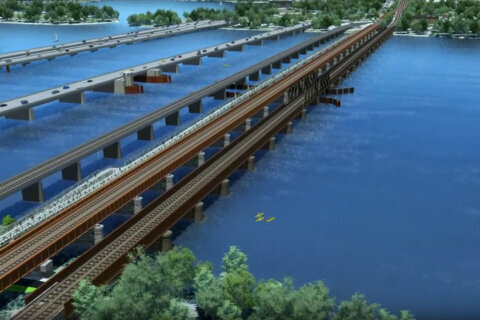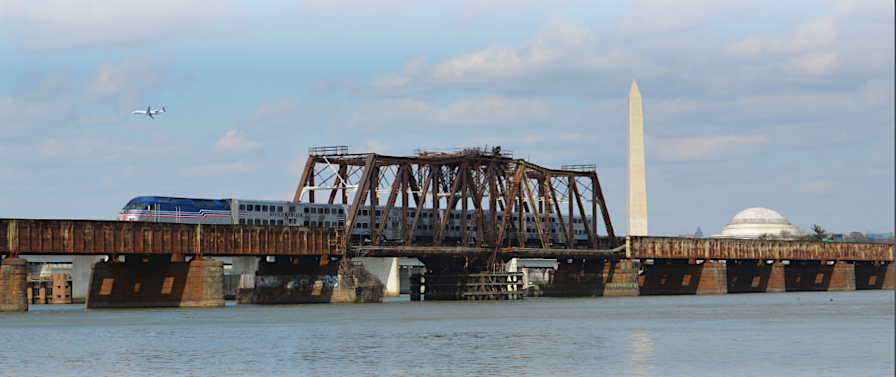New Potomac bridge: Officials take first steps on project to double passenger rail capacity
Neal Augenstein | naugenstein@wtop.com
August 29, 2023, 9:51 AM

A proposed rendering of the Long Bridge project — adding a fourth rail track across the Potomac River and doubling passenger rail capacity. (Courtesy Virginia Passenger Rail Authority)
Preliminary soil testing will soon begin before construction of a passenger rail bridge that aims to untangle daily passenger rail service between Virginia and the District of Columbia. ... The long-term goal of the Long Bridge Project is “to double the capacity of passenger rail between Washington, D.C. south, into Virginia,” said DJ Stadtler, executive director of the Virginia Passenger Rail Authority.
Currently, all passenger and freight trains crossing the Potomac River share the Long Bridge — a two-track bridge which is owned by CSX, located east of the 14th Street Bridge. “That bridge is 100 years old or so, and it’s currently at about 98% capacity during peak hours.”
With the bridge carrying both freight and passenger lines, VPRA is tasked with expanding the availability of passenger and commuter rail service in Virginia. Improving and increasing passenger rail service, would make it feasible for drivers to leave their cars at home.
{snip}
The project will also include a bicycle and pedestrian crossing that will connect Long Bridge Park and the Mount Vernon Trail in Arlington to the East and West Potomac Parks in Washington.
Get breaking news and daily headlines delivered to your email inbox by signing up here.
© 2023 WTOP. All Rights Reserved. This website is not intended for users located within the European Economic Area.
Neal Augenstein
Neal Augenstein has been a reporter at WTOP since 1997. Through the years, Neal has covered many of the crimes and trials that have gripped the region. Neal's been pleased to receive awards over the years for hard news, feature reporting, use of sound and sports.
naugenstein@wtop.com
@AugensteinWTOP
erronis
(16,762 posts)I've been a DC/MD/VA resident on/off for over 70 years - before I-495 and I-66. I don't live there anymore and have no desire to drive into the maelstrom.
If the problem is inner-city (DC metro) traffic, this makes some sense. But workforces are becoming more mobile and having hordes of people descending on one building (Pentagon for example) doesn't seem to be true anymore.
While the major concentrated traffic is obviously into the city, much of what passes up and down the east coast is trucks and passenger cars along I-95. The local governments tried to divert traffic by renaming routes (295/395/495) and signage. Real travelers know the best ways.
DC can either go to the east or to the west to find new alternate routes. East takes them into hallowed grounds with lots of landed gentries. Also, the wetlands of the Chesapeake are sort of in the way.
West takes them into some bucolic rolling hills of perhaps Fairfax/Loudon, Montgomery/Frederick. Forty or fifty years ago (when I-270 was being built), these bucolic areas were probably easy to seize with eminent domain. Now, these four counties are among the richest in the country.
How about an elevated highway - I-95 from Springfield to Laurel. Probably about 1,000 feet above ground (sorry "Reagan" International Airport). Need to think about the future and make it 12-20 lanes. Support columns will be probably spaced into every green plot in the city.
mahatmakanejeeves
(60,665 posts)Amtrak services involved include the Northeast Regional trains from New York (and beyond) to Richmond, Norfolk, and Newport News; the Carolinian to North Carolina; the Palmetto to Savannah; the Silver Meteor and Silver Star to Florida; Northeast Regional trains to Roanoke (and not too far in the future, beyond); the Cardinal to Chicago; and the Crescent to New Orleans.
VRE commuter trains head either to Fredericksburg or to Manassas.
CSX freights head south toward Richmond VA and Rocky Mount NC or north to Baltimore, Philadelphia, or Cumberland.
I think the speed limit on the existing bridge is 25 mph. The old RF&P is three tracks from Franconia-Springfield to what used to be called RO, next to the lacrosse field north of Crystal City. The existing bridge is two tracks.
During the war, there was a railroad bridge that crossed the Potomac River between Alexandria and where the Naval Research Laboratory is now.
The existing bridge:
Long Bridge Over the Potomac River

The emergency bridge that crossed the Potomac during WWII:
Posted by Malcolm Kenton
on Wednesday, January 30, 2019
{snip}
Before DDOT began its study, the last time any government had taken any sort of action related to the Long Bridge was in 1942, shortly after the U.S. entered World War II. The Long Bridge’s pivotal role in the East Coast rail network at that time was nearly identical to what it is today (it carried between 165 and 185 daily trains in 1945), and with the nation’s capital being a prime target for the Luftwaffe, military and federal leaders realized that a targeted bombing of the Long Bridge would significantly weaken the U.S., especially since many personnel and materials for the war effort were moving by train. The solution that was arrived at was to install a temporary railroad bridge across the Potomac from Alexandria, Va. to southwest D.C., connecting the Richmond, Fredericksburg and Potomac main line on the Virginia side with the Baltimore & Ohio’s Shepherd Branch (formerly Alexandria Branch) on the D.C. side that was built in 1874. The branch carried once-weekly deliveries of chlorine gas to the D.C. Water and Sewer Authority’s Blue Plains Wastewater Treatment Plant until 2001, when the shipments were deemed a security threat after Sept. 11 and the line was abandoned.
https://cs.trains.com/cfs-file.ashx/__key/communityserver-blogs-components-weblogfiles/00-00-00-11-12-Malcolm+Kenton/0755.EmergencyBridge_5F00_Potomac_5F00_RailroadMag1946.jpg
Photo of the Emergency Bridge in open position in Oct. 1944 from the Dec. 1946 Railroad Magazine, from the collection of Ken Briers.
Within the span of nine months (the plans were drawn up shortly after the bombing of Pearl Harbor), a decommissioned 3,360-foot bridge that carried the Grand Trunk Western over the Saginaw River in Bay City, Mich. was cut into seven sections and shipped by barge up the St. Lawrence River, down the Atlantic coast and up the Potomac, then reassembled. This double-track “Emergency Bridge” opened in November 1942 and carried a number of train movements, all northbound (emergency plans were in place to handle southbound traffic, but were never activated), including up to 86 troop trains each month. According to a Dec. 1946 story in Railroad Magazine, the bridge largely remained in the open position to allow maritime traffic to pass, closing only when a train was approaching. After the bridge was installed, the entire Shepherd Branch was relaid with 100-pound rail and switches, signals and grade crossing warning devices were upgraded. Some scheduled northbound passenger trains were sent across the new bridge as an experiment, the result being that they reached Washington Union Station from Alexandria via the Virginia Avenue tunnel in about the same time as trains crossing Long Bridge. One complication of the routing was that the B&O line passed through the middle of the Army installation then called Bolling Field, just on the D.C. side of the bridge, necessitating that armed guards ride every train to prevent unauthorized access to the facility, and that trains yield to aircraft that zoomed in and out of Bolling at frequent intervals.
Shortly after the war’s end, on Nov. 14, 1945, the temporary bridge was withdrawn from service and disassembled two years later. Long Bridge has borne the bulk of East Coast rail traffic for the subsequent 74 years. Will it take another imminent threat of attack or other crisis for those in leadership positions to muster the will to make a generational investment in a replacement bridge that may last for another century-plus? It shouldn’t have to come to that. We just need leaders who have foresight about our infrastructure and consider what is needed to sustain our standard of living, particularly considering the many implications of climate change.
Disclaimer: Malcolm Kenton is a freelance contributor to Trains and an independent consultant specializing in writing, research and communications with a focus on passenger rail and transit. His clients include Herzog Transit Services, Inc. and the Association of Independent Passenger Rail Operators. He is also an avid and frequent train traveler. The views expressed in Observation Tower are solely his own and do not reflect the positions or business interests of any of his clients.
erronis
(16,762 posts)The info on the Long Bridge is interesting. Of course Chain Bridge (Rt. 123) has a fascinating history also.
mahatmakanejeeves
(60,665 posts)There’s discussion of coordinating the MARC (Maryland commuter rail service) and the VRE (Virginia Railway Express) so that there are at least a few trains that could take you through Union Station in DC without your having to get off one train and board another. That’s a bit more complicated. I wouldn’t expect that right away.
erronis
(16,762 posts)I used to drive the 14th St. bridge between the Pentagon and downtown almost every day. I never thought that much about the tracks alongside. Had driven across a couple of hours before Air Florida flight #90.